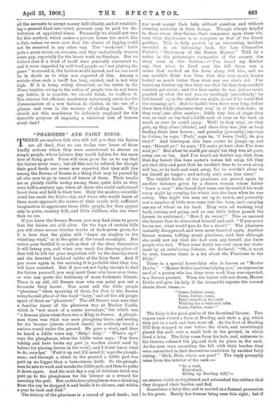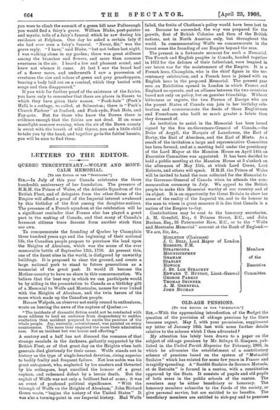" PHARISEES " AND FAIRY RINGS.
THERE are modern folk who will tell you that the fairies are all dead, that no one to-day ever bears of those kindly actions which they were accustomed to shower on simple people, whose labours they would lighten for the mere love of doing good. Some will even go so far as to say that the fairies never were; but all this can be refuted, for though their good deeds are never now reported, that they still live among the Downs of Sussex is a thing that may be proved by all who care to go in search of traces of them. Their tracks are as plainly visible to-day among these quiet hills as they were half-a-century ago, when all those who could understand loved them and held to their lore. Only the modern scientific mind has made the fairies shy, and those who would know of them must approach the scenes of their revels with sufficient imagination to appreciate these little people, for they appear only to poets, country folk, and little children, who are wiser than we are.
If you know the Sussex Downs, you may find clues to prove that the fairies are still alive. On the tops of certain hills you will come across circular tracks of dark-green grass, for it is here that the pixies still "dance on ringlets to the whistling wind," or in the quiet of the broad moonlight. But unless your footfall is as soft as that of the elves themselves it will betray you, and when you reach the dancing-place all that will be left for your inspection will be the dancing-track and the deserted toadstool tables of the fairy feast. And if you come again in the morning it is probable that they, too, will have vanished. But if you are not lucky enough to find the fairies yourself, you May meet those who have seen them, or who can quote the testimony of more .fortunate friends. There is an old, old Sussex man who can point you out a favourite fairy haunt. You must call the little people " pharisees " when speaking of them, for that is the Sussex reduplicated plural of the word "fairy," and all the old people speak of them as "pharisees." The old Sussex man says that a familiar haunt of the pharisees was at Burlow Castle, which is "not much of a castle nowadays," but which was "a famous place when there was a King in Sussex. A plough- man there was what was once ploughing there, and resting for his 'levener [eleven o'clock lunch] be suddenly heard a curious sound under the ground. He gave a start, and then he heard a liddle voice say, ' Help ! help ! " What's up ? ' says the ploughman, when the liddle voice says : I've been baking and have broke my peel [a wooden shovel used by bakers for placing loaves in the oven], and I doiint know what to do, sure-lye." Putt it up and I'll mend it,' says the plough- man; and through a chink in the ground a liddle peel was putt up no bigger than a bren-cheese knife. So the plough- man he sets to work and mends the liddle peel, and then be putts it down again. And the next day a cup of delicious drink was putt up to the ploughman for his 'levener as a reward for mending the peel. But as this here ploughman was a-drinking from the cup he dropped it and broke it to shivers, and within a year he took and died."
The history of the pharisees is a record of good deeds ; but
you must accept their help without question and ivithiptit evincing curiosity in their doings. Though alwayn heiptal
to those whom they favour, their vengeance upon those wilt earn their displeasure is as complete as that of the Greek goddess. This is fully proved by an interesting incident recorded in an informing book, the late Cliancellet Parish's "Dictionary of the Sussex Dialect." Told by it native in the picturesque vernacular of the county, the story runs in this fashion :—" rye heard my feather say, that when he lived over the hill there was a carter that worked on the farm along wid him, and no one couldn't think bow 'twas that this here man's horses looked so much better than what any one else's did. I've heard my feather say that they was that fat that they couldn't scarcely get about; and this here carter he was just as much
puzzled as what the rest was, so cardingly [accordingly] Ile laid hisself up in the staiible one night, to see if he could find the meaning ant. And he hadn't been there very long, before
these here liddle pharisees they crep' in at the sink-hole ; in they crep', one after another; liddle tiny bits of chaps they was, an each an 'em had a liddle sack of corn on his back, as much as ever be could carry. Well! in they crep', on they
gets, up they clime [climbs], and there they was, just as busy feeding these here horses ; and prensley [presently] one says to t'other, be says, Puck,' says he, 'I twets [twit], do yoit twet ? ' And thereupon this here carter be jumps up and says, Dannel ye !' he says, I'll make ye twet afore I've done
wud ye !' But afore be could get ailigh they iñss all gone, every one an 'em. And I've heard my feather say, that from that day forard this here carter's horses fell away, till they
got that thin and poor that he couldn't bear to be seen along wid 'em, so he took and went away, for he couldn't abear to
see hisself no longer; and nobody ain't seen him since." The helpful habits of the pharisees are proved again by another instance given by a Sussex woman whose father "knew a man" who found that some one forwarded his work every night by carrying his wheat into the barn when he was asleep. One night the man sat up to watch, and presently saw a number of little men come into the barn, each carrying one ear of wheat on his back. They were all working very hard, coining and going. and as one little fellow passed the farmer he exclaimed : "How I do sweat!" This so amused the farmer that he discovered himself and said : "If you sweat for an ear, what would you do for a sheaf ? " The pharisees instantly disappeared, and were never beard of again. Another Sussex woman, talking about pharisees, said that although she could not say that she had seen any herself, she knew people who had. When some doubt was cast upon her state- ment by an unbelieving listener, she declared : "Oh, it must be true, because there is a lot about the Pharisees in the Bible."
There is a special house-fairy who is known as "Master Dobbs." "Master Dobbs has been helping you," an expression used of a person who has done more work than was expected, is a Sussex proverb. When the butter will not churn, Master Dobbs will give his help if the housewife repeats the correct charm three times :—
" Come, butter, come, Come, butter, come, Peter stands at the gate Waiting for a buttered cake.
Come, butter, come!"
The fairy is the good genius of the downland farmer. Two rogues once visited a farm at Beeding and stole a pig, which they put in a sack and then went off. At the foot of Beeding Hill they stopped to rest before the climb, and unwittingly placed the sack over a small hole in the ground, in which lived a fairy. The fairy came from his hole, and, unknown to the thieves, released the pig and took its place in the sack.
As the men were ascending the hill with their burden they were astonished to find themselves overtaken by another fairy crying : "Dick, Dick, where are you?" The reply promptly came from the interior of the sack :—
"In a sack, Pick-aback,
Riding up Seeding
an answer which so frightened and astonished the robbers that they dropped their burden and fled.
Sometimes a fairy dies, and is carried in a funeral procession to his grave. Rarely has human being seen this sight ; but if
you were to climb the summit of a green hill near Pulborongla you would find a fairy's grave. William Blake, poet-painter and mystic, tells of a fairy's funeral which he saw during his residence at Felpham. One day he asked a certain lady if she had ever seen a fairy's funeral. "Never, Sir," was the grave reply. "I have," said Blake, "but not before last night. I was walking alone in my garden; there was great stillness among the branches and flowers, and more than common sweetness in the air. I heard a low and pleasant sound, and knew not whence it came. At last I saw the broad leaf of a flower move, and underneath I saw a procession of creatures the size and colour of green and grey grasshoppers, bearing a body laid out on a roseleaf, which they buried with songs and then disappeared."
If you wish for further proof of the existence of the fairies, you have only to remember that there are places in Sussex to which they have given their names. "Pook-hale " (Puck's Hall) is a cottage, so called, at Selmeston; there is "Puck's Church Parlour" at Seaford, and Pook-ryde, Pook Hole, and Fay-gate. But for those who know the Downs there is evidence enough that the fairies are not dead. If on some moonlight summer evening, when the air of the Down county is sweet with the breath of wild thyme,you ask a little child to take you by the hand, and together go to the fairies' haunts, you will be sure to find them.























































 Previous page
Previous page